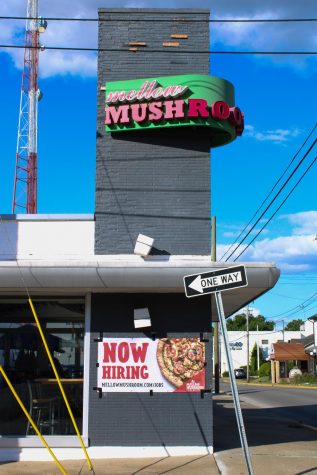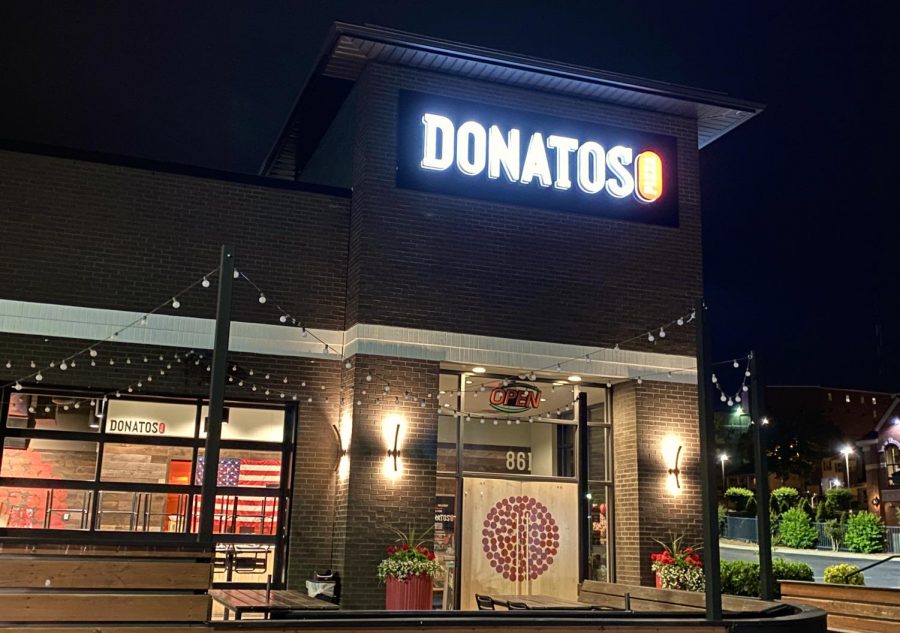Local businesses face challenges while seeking employees
Donato’s has advertised via email that the business is hiring. In their email, they offered coupons to people who applied. Manager of Donato’s, Jeff Lyzears, said the location had a reliable group of employees currently.
May 19, 2021
As COVID-19 restrictions are lifted, returning life to a bit of normalcy, employers throughout Bowling Green and on Western Kentucky University’s campus are not seeing the return to normal as everyone else. They are struggling to find workers to fill the jobs that were vacant during the pandemic.
A common argument explaining the situation is the ease of accessibility to government assistance and people receiving stimulus checks has made people less likely to find work.
Jerrell Kelly sees the problem every day as he struggles to hire at least 10 counselors for WKU’s Campus Recreation and Wellness, where he is the assistant director.
“We asked that because Camp Big Red is something that goes all day every day, we need folks that are not enrolled in summer classes,” Kelly said. “Beyond that, we’re really looking for folks who have that passion and excitement around working with kids, to try to help us to make the best environment that we can.
Kentucky’s seasonally adjusted unemployment rate for March of 2021 was 5.8 percent, according to a report released by Kentucky Center for Statistics. Kentucky’s preliminary seasonally adjusted unemployment rate for March 2021 was 5 percent, according to a press release from KYSTATS, an agency within the Education and Workforce Development Cabinet.
One group on campus was especially hit hard was Camp Big Red. The day camp that runs daily during the summer provides an environment filled with games and outdoor activities to spend the day, but this summer, Camp Big Red was canceled due to not finding enough staff.
There was difficulty planning Camp Big Red because at the time of planning for the summer, no one was aware of what life would be by the time June arrived, Kelly said.
“We had to cancel last year’s Camp Big Red because of COVID,” Kelly said. “This year, essentially, we’re in that same boat, but it’s our plan to be kind of smooth sailing moving forward.”
Kelly added more students are focused on using this summer as a break after the past year.
“There have been more folks that are more focused on, especially with this summer, saying ‘I’m going to go home, I’m going to recharge my batteries, I’m going to have that chance to relax after a pretty challenging year,” Kelly said.
Kelly said finding student employees has been a campus-wide issue, as well as a Bowling Green-wide issue.
Local restaurants, including Donato’s have been advertising to find employees. Restaurants such as Zaxby’s, Steak n’ Shake and Mellow Mushroom have advertised for months around their buildings that they are hiring.

Jeff Lyzears is a manager at the Donato’s on Fairview Avenue. He said the business has not received many applications lately but they currently have the number of employees to maintain the business.
“We’ve honestly got a really great crew here with us,” Lyzears said. “[They] just put in extra work and helped us through. In the grand scheme of things, there’s not a lot of people out there applying right now, but we have found ourselves in a good position.”
While many businesses took a hit during the shutdown and throughout the pandemic, Donatos didn’t see the same effects that other businesses have and was able to continue serving pizza, according to Lyzears.
“When everything was shut down for the pandemic even before that happened, we stayed really steady,” Lyzears said. “Of course we did have the availability to operate with delivery, and our drive thru Windows still during the shutdown so we were honestly pretty busy through all of that as well.”
Alexander Lebedinsky, WKU department chair of Gordon Fordand professor of economics, explained what the potential effects are between government assistance and businesses struggling to find employment.
“Let’s say the government just gives you a stimulus check, it will increase your income,” Lebedinsky said. “You will buy more stuff from other people, you increase their income, and it’s got this cascading effect that continues to take place. We call this the multiplier effect because it just kind of continues to go on and on.”
Full employment is what is considered to be the “acceptable rate of employment in our economy,” which is typically in between four and five percent, Lebedinsky said.
“If you are at full employment, this extra spending is not going to do anything, because everybody who wants the job already has one,” Lebedinsky said. “Throwing more money in the form of a stimulus is not going to do anything, it’s only going to create inflation by raising the prices, which is what we might be starting to experience right now.”
The current U.S. inflation rate as of April 2021 is 0.8 percent. That means consumer prices increased 0.8 percent from March, according to the Bureau of Labor Statistics. The increase was primarily driven by a 10.0 percent increase in used car and truck prices.
Factors of COVID-19 could be affecting the economy as well. Last year by April 15, the U.S was at the worst point economically of the recession. At that time, the gross domestic product dropped by 9.4 percent, which is a drop that hasn’t been seen since the Great Depression, said Lebedinsky.
The government has done three things that have impacted how people have spent during the pandemic: the government shutdown businesses, the government provided people with stimulus checks if they made a specific range of income, and the government provided loans to businesses.
“Once those low income households got more money, they were not spending on local businesses,” Lebedinsky said. “Instead, they were buying it, you know, things, what we call durable goods. So instead of going out to eat and things like that, we’ll go on to Amazon, Best Buy, Lowe’s and Sam’s Club.”
Digital News Editor Debra Murray can be reached at [email protected]. Follow her on Twitter @debramurrayy
























